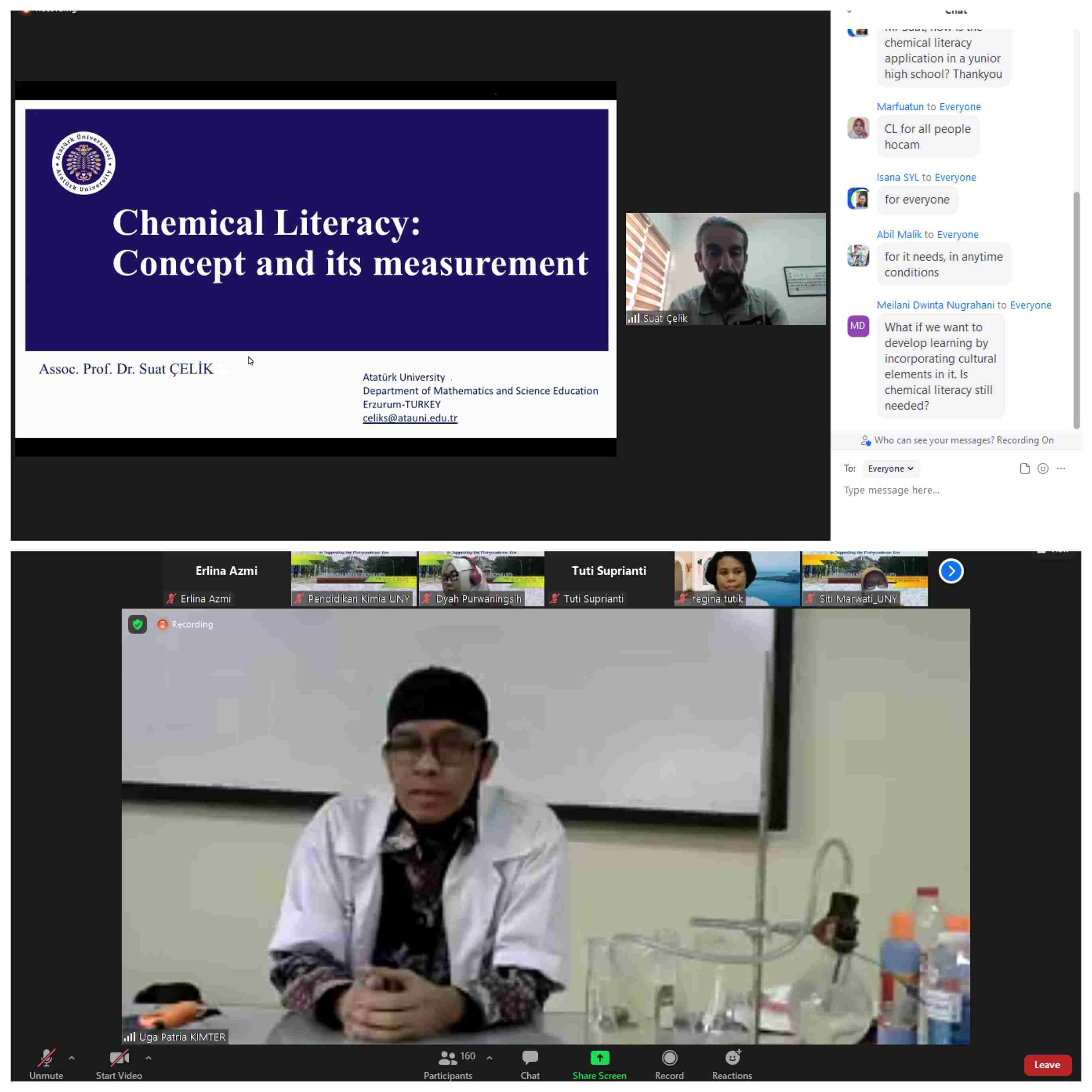 Bahasa Indonesia
Bahasa Indonesia English
English
You are here
WEBINAR SERIES #2 CHEMISTRY EDUCATION DEPARTMENT, 2022

Friday, October 14 2022, the Chemistry Education Department, FMIPA UNY has held Webinar Series #2 with expert speakers in the field of chemistry and education. The webinar, which was held online via Zoom Meeting, was attended by 140 participants including teachers, students, lecturers and practitioners in the fields of chemistry and education. Dr. Antuni Wiyarsi, M.Sc as Chair of the Chemistry Education Study Program, FMIPA UNY, gave his speech as part of the opening of Webinar Series #2. On this occasion, the Chemistry Education Department, FMIPA UNY presented Assoc. Prof. Dr. Suat Celik from Ataturk University, Turkiye and Uga Patriajasa, M.Pd are the National Coaches for Applied Chemistry, Indonesia.
The first material was delivered by Prof. Suat Celik with the title Chemical Literacy: Concept and its Measurement. Chemistry has abstract characteristics so that to explain it it must be linked to three levels of representation, namely macroscopic, microscopic and also symbolic. Chemical literacy is defined based on Bybee's (1991) framework on scientific literacy. Chemical literacy develops hierarchically which can be seen from the levels of chemical literacy, namely nominal literacy, functional literacy, conceptual literacy and multifunctional literacy. Chemical literacy consists of four indicators or domains, namely chemical content knowledge, chemistry in context, higher level learning skills and affective aspects (Shwatz et al., 2006). Prof. Suat Celik revealed that students' level of chemical literacy while at school can only show whether they have seeds of literacy, namely by looking at the effectiveness of chemistry courses or chemistry learning in forming attitude values, basic skills, knowledge and understanding of chemistry. Measuring chemical literacy mostly uses open-ended items, open-ended two tier and multiple-choice questions.
Meanwhile, Uga Patriajasa, M.Pd delivered the second material in the field of applied chemistry with the title "Applied Science Practicum Using Local Materials". Learning using practicums can increase students' motivation to study chemistry. The materials used for practicums do not have to be expensive chemicals but can also use simple ingredients such as kitchen ingredients, namely table salt, etc. so that students are interested and motivated. Learning that is carried out only using the explanation/lecture method will tend to make students bored, therefore, to increase student motivation, teachers must have the ability to resonate with students by providing interesting learning. Specifically, science learning should be linked to real life. Interesting examples that can be given to students are changes in color, changes in heat, the presence of deposits of something that students can observe so that they can arouse curiosity and increase students' interest in learning.
Interactive discussions after the delivery of the material indicated that the material presented attracted participants' interest in developing learning and research. With the implementation of Webinar Series #2, it is hoped that it can become a learning tool to jointly prepare innovative learning. Apart from that, innovative chemical research can support the development of science.
Sistem Informasi
Kontak Kami
Program Studi Pendidikan Kimia
FMIPA Universitas Negeri Yogyakarta
Gedung Dekanat D.07 FMIPA UNY
Kampus Karangmalang Yogyakarta 55281
Telp. (0274)586168 Pes. 115
Email: pend_kimia@uny.ac.id
Copyright © 2025,
